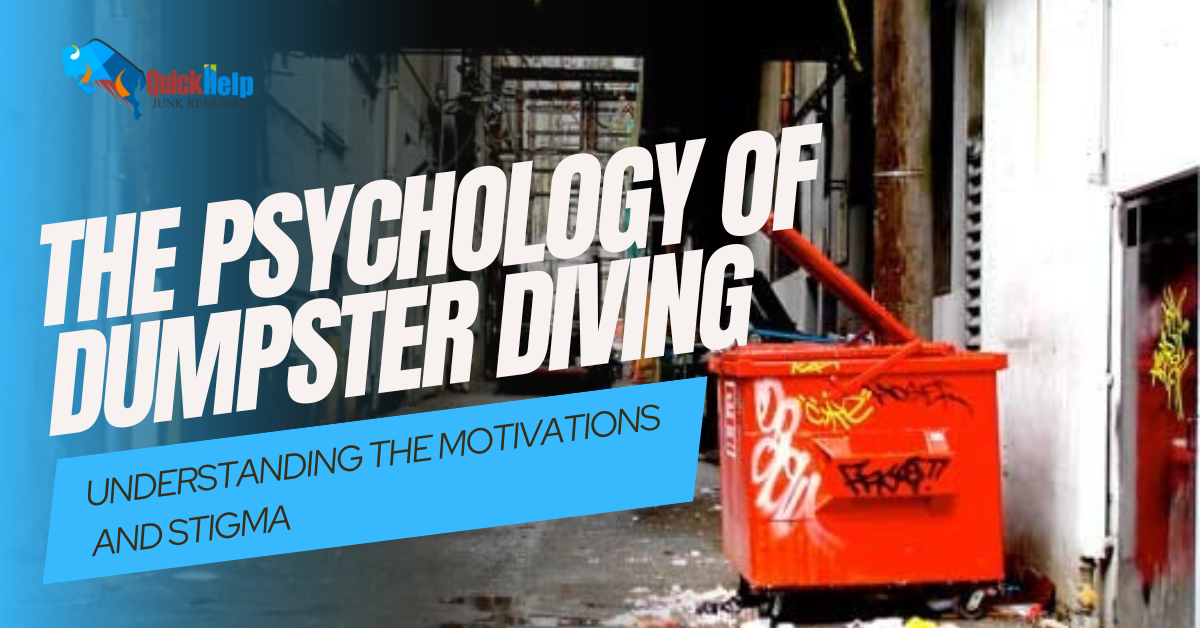Psychology of Dumpster Diving
Introducing Psychology of Dumpster Diving is an activity that has long fascinated and perplexed many people. Whether it’s portrayed in movies or witnessed firsthand, the act of rummaging through discarded items in dumpsters can evoke a range of emotions and raise questions about human behavior. In this blog post, we delve into the psychology behind dumpster diving, exploring the motivations that drive individuals to engage in this activity and the stigma that often surrounds it.
Understanding the Motivations
At first glance, it may be easy to assume that dumpster diving is solely driven by financial necessity. While economic factors certainly play a role, the motivations behind this activity are often more complex. One common motivation is the quest for resources. Many dumpster divers are resourceful individuals who see discarded items as opportunities. They believe in repurposing and reducing waste, striving to find useful items that others have discarded prematurely.
Another motivation is the thrill of the hunt. Dumpster diving can be an adventure, a way to break free from societal norms and explore hidden treasures. The uncertainty of what might be found adds an element of excitement and curiosity. For some, it becomes a form of urban exploration, revealing insights into consumer culture and the wastefulness of society.
Additionally, dumpster diving can be an act of activism. Some individuals engage in this activity to raise awareness about consumerism and the environmental impact of excessive waste. By diving into dumpsters and documenting their findings, they shed light on the magnitude of discarded items and encourage conversations about sustainability and responsible consumption.
The Stigma Surrounding Dumpster Diving
Despite the multifaceted motivations behind dumpster diving, there is a pervasive stigma associated with the activity. Society often views it as dirty, unhygienic, and even illegal. This stigma stems from misconceptions and a lack of understanding. It is important to note that dumpster diving is not always illegal; laws regarding the retrieval of discarded items vary by location.
One reason for the stigma is the association of dumpsters with trash and waste. Dumpster divers challenge the conventional notion of waste, blurring the lines between what is considered garbage and what still holds value. This discomforts many people who adhere to a strict consumerist mentality.
Moreover, the stigma surrounding dumpster diving can also be attributed to a fear of the unknown. People tend to fear what they do not understand, and the idea of rummaging through someone else’s discarded possessions can be unsettling to some. Fear of contamination, pests, and social judgment further contribute to the negative perception.
Changing Perspectives and Building Bridges
To address the stigma associated with dumpster diving, it is essential to promote education and understanding. By sharing stories of successful finds and highlighting the positive impact of this activity on waste reduction and resourcefulness, we can shift public perception. Encouraging conversations about responsible consumption, the environmental consequences of overconsumption, and the importance of recycling and repurposing can help bridge the gap between different perspectives.
Dumpster diving is a complex and multi-faceted activity, driven by various motivations that extend beyond financial necessity. While it faces stigma due to misconceptions and a lack of understanding, it offers valuable insights into consumer culture, waste reduction, and the importance of resourcefulness. By fostering a more informed and open-minded perspective, we can challenge the negative stigma surrounding dumpster diving and promote a more sustainable and conscious approach to consumption.




